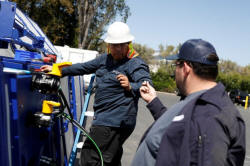Robots fight weeds in challenge to agrochemical giants
 Send a link to a friend
Send a link to a friend
 [May 22, 2018]
By Ludwig Burger and Tom Polansek [May 22, 2018]
By Ludwig Burger and Tom Polansek
YVERDON-LES-BAINS, Switzerland/CHICAGO
(Reuters) - In a field of sugar beet in Switzerland, a solar-powered
robot that looks like a table on wheels scans the rows of crops with its
camera, identifies weeds and zaps them with jets of blue liquid from its
mechanical tentacles.
Undergoing final tests before the liquid is replaced with weedkiller,
the Swiss robot is one of new breed of AI weeders that investors say
could disrupt the $100 billion pesticides and seeds industry by reducing
the need for universal herbicides and the genetically modified (GM)
crops that tolerate them.
Dominated by companies such as Bayer, DowDuPont, BASF and Syngenta, the
industry is bracing for the impact of digital agricultural technology
and some firms are already adapting their business models.
The stakes are high. Herbicide sales are worth $26 billion a year and
account for 46 percent of pesticides revenue overall while 90 percent of
GM seeds have some herbicide tolerance built in, according to market
researcher Phillips McDougall.
"Some of the profit pools that are now in the hands of the big
agrochemical companies will shift, partly to the farmer and partly to
the equipment manufacturers," said Cedric Lecamp, who runs the $1
billion Pictet-Nutrition fund that invests in companies along the food
supply chain.
In response, producers such as Germany's Bayer have sought partners for
their own precision spraying systems while ChemChina's Syngenta [CNNCC.UL],
for example, is looking to develop crop protection products suited to
the new equipment.

While still in its infancy, the plant-by-plant approach heralds a marked
shift from standard methods of crop production.
Now, non-selective weedkillers such as Monsanto's Roundup are sprayed on
vast tracts of land planted with tolerant GM seeds, driving one of the
most lucrative business models in the industry.
'SEE AND SPRAY'
But ecoRobotix https://www.ecorobotix.com/en, developer of the Swiss
weeder, believes its design could reduce the amount of herbicide farmers
use by 20 times. The company said it is close to signing a financing
round with investors and is due to go on the market by early 2019.
Blue River, a Silicon Valley startup bought by U.S. tractor company
Deere & Co. for $305 million last year, has also developed a machine
using on-board cameras to distinguish weeds from crops and only squirt
herbicides where necessary.
Its "See and Spray" weed control machine, which has been tested in U.S.
cotton fields, is towed by a tractor and the developers estimate it
could cut herbicide use by 90 percent once crops have started growing.
German engineering company Robert Bosch http://www.bosch-presse.de/pressportal/de/en/research-collaboration-between-bosch-and-bayer-turns-farms-digital-125120.html
is also working on similar precision spraying kits as are other startups
such as Denmark's Agrointelli
http://agrointelli.com/roboweedmaps.html.

ROBO Global https://www.roboglobal.com/about-us, an advisory firm that
runs a robotics and automation investment index tracked by funds worth a
combined $4 billion, believes plant-by-plant precision spraying will
only gain in importance.
"A lot of the technology is already available. It's just a question of
packaging it together at the right cost for the farmers," said Richard
Lightbound, Robo's CEO for Europe, the Middle East and Africa.
"If you can reduce herbicides by the factor of 10 it becomes very
compelling for the farmer in terms of productivity. It's also eco
friendly and that's clearly going to be very popular, if not compulsory,
at some stage," he said.
'PAUSE FOR THOUGHT'
While Blue River, based in Sunnyvale, California, is testing a product
in cotton fields, it plans to branch into other major crops such as soy.
It expects to make the product widely available to farmers in about four
to five years, helped by Deere's vast network of equipment dealers.
ROBO's Lightbound and Pictet's Lecamp said they were excited by the
project and Jeneiv Shah, deputy manager of the 152 million pound ($212
million) Sarasin Food & Agriculture Opportunities fund, said the
technology would put Bayer and Syngenta's crop businesses at risk while
seed firms could be hit - albeit to a lesser extent.
"The fact that a tractor and row-crop oriented company such as John
Deere did this means it won't be long before corn or soybean farmers in
the U.S. Midwest will start using precision spraying," Shah said.
While the technology promises to save money, it could be a tough sell to
some U.S. farmers as five years of bumper harvests have depressed prices
for staples including corn and soybeans. U.S. farm incomes have dropped
by more than half since 2013, reducing spending on equipment, seeds and
fertilizer.

Still, the developments are giving investors in agrochemicals stocks
pause for thought, according to Berenberg analyst Nick Anderson. And
agrochemical giants are taking note.
Bayer, which will become the world's biggest seeds and pesticides
producer when its acquisition of GM crop pioneer Monsanto completes,
teamed up with Bosch in September for a "smart spraying" research
project.
The German partners plan to outpace rivals by using an on-board arsenal
of up to six different herbicides and Bayer hopes the venture will
prepare it for a new commercial model - rather than cannibalizing its
current business.
"I would assume that within three years we would have a robust
commercially feasible model," Liam Condon, the head of Bayer's crop
science division said in February.
[to top of second column] |

Engineers assemble a Blue River Technology See & Spray agricultural
machine that combines computer vision and artificial intelligence to
detect and precisely spray herbicides onto weeds in a farm field in
Sunnyvale, California, April 23, 2018.REUTERS/ Stephen Lam

"I'm not concerned in terms of damping sales because we don't define ourselves
as a volume seller. We rather offer a prescription for a weed-free field, and we
get paid based on the quality of the outcome," he said.
Bayer agreed to sell its digital farming ventures, including the Bosch project,
to German rival BASF as part of efforts to win antitrust approval to buy
Monsanto. But BASF will grant Bayer an unspecified license to the digital assets
and products.
BASF said the Bosch precision spraying collaboration was very interesting but it
was too early to comment further as the transaction had not completed.
'PART OF THE STORY'
Syngenta, which was an investor in Blue River before Deere took over, said the
advantages of the new technology outweighed any potential threats to its
business model.
"We will be part of the story, by making formulations and new molecules that are
developed specifically for this technology," said Renaud Deval, global head of
weed control at Syngenta, which was bought by ChemChina last year.
While it has no plans to invest directly in engineering, Syngenta is looking
into partnerships where it can contribute products and services, Deval said.
Still, Sarasin's Shah said the big agrochemical firms would need to accelerate
spending on getting their businesses ready for new digital agricultural
technology.
"The established players need to invest a lot more than they currently are to be
positioned better in 10 years' time. The sense of urgency will increase as
farmers start to adopt some of the more advanced kits that are coming out," he
said.
Michael Underhill, chief investment officer at Capital Innovations, also said
the major players may be underestimating the potential impact on their
pesticides businesses.

"Precision leads to efficiency, efficiency leads to decreased usage, decreased
usage leads to decreased margins or margin compression, and that will lead to
companies getting leaner and meaner," said Underhill.
He said the GM seeds market would also take a hit if machine learning takes over
the role genetic engineering has played so far in shielding crops from
herbicides' friendly fire.
"Instead of buying the Cadillac of seeds or the Tesla of seeds, they may be
buying the Chevy version," Underhill said.
NEW WEAPONS
The advent of precision weed killing also comes at a time blanket spraying of
global blockbusters such as glyphosate is under fire from environmentalists and
regulators alike.
More than 20 years of near-ubiquitous use of glyphosate, the active substance in
Monsanto's Roundup, has created resistant strains of weeds that are spreading
across the U.S. farm belt.
Regulators have raised the bar for bringing blanket chemical agents to market
and the fear of toxic risks has been heightened by the debate over the potential
impact of glyphosate on health.
Michael Owen, associate chair at Iowa State University's Department of Agronomy,
reckons it would now cost agrochemical giants up to an almost prohibitive $400
million to develop a next-generation universal weedkiller.
Bayer's Condon said in the current environment precision spraying could well be
the final blow to further attempts to develop new broad-spectrum or
non-selective herbicides.

"Everything that comes tends to be selective in nature. There won't be a new
glyphosate. That was probably a once-in-a-lifetime product," said Condon.
For now, the industry is reviving and reformulating older, broad-spectrum agents
known as dicamba and 2,4-D to finish off glyphosate-resistant weeds - and it is
selling new GM crops tolerant to those herbicides too.
Precision spraying could mean established herbicides whose effect has worn off
on some weeds could be used successfully in more potent, targeted doses, said
Claude Juriens, head of business development at ecoRobotics in Yverdon-les Bains.
But experts say new products will still be needed for the new technology and
some chemical firms are considering reviving experimental herbicides once deemed
too costly or complex.
"Because we're now giving the grower an order of magnitude reduction in the
amount of herbicide they're using, all of a sudden these more expensive, exotic
herbicides are now in play again," said Willy Pell, Blue River director of new
technology.
"They've actually devoted resources to looking through their backlog, kind of
cutting room floor, and rethinking these different materials with our machine in
mind," he said.
(Additional reporting by Rod Nickel in Toronto and Simon Jessop in London;
editing by David Clarke)
[© 2018 Thomson Reuters. All rights
reserved.] Copyright 2018 Reuters. All rights reserved. This material may not be published,
broadcast, rewritten or redistributed.
Thompson Reuters is solely responsible for this content.
 |